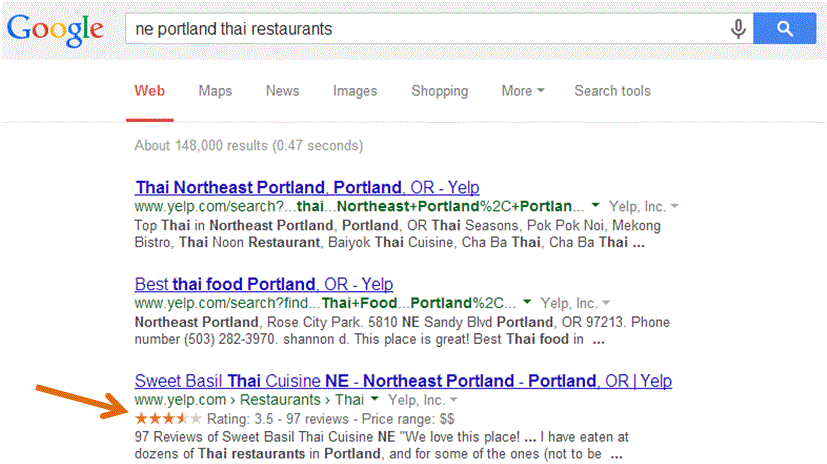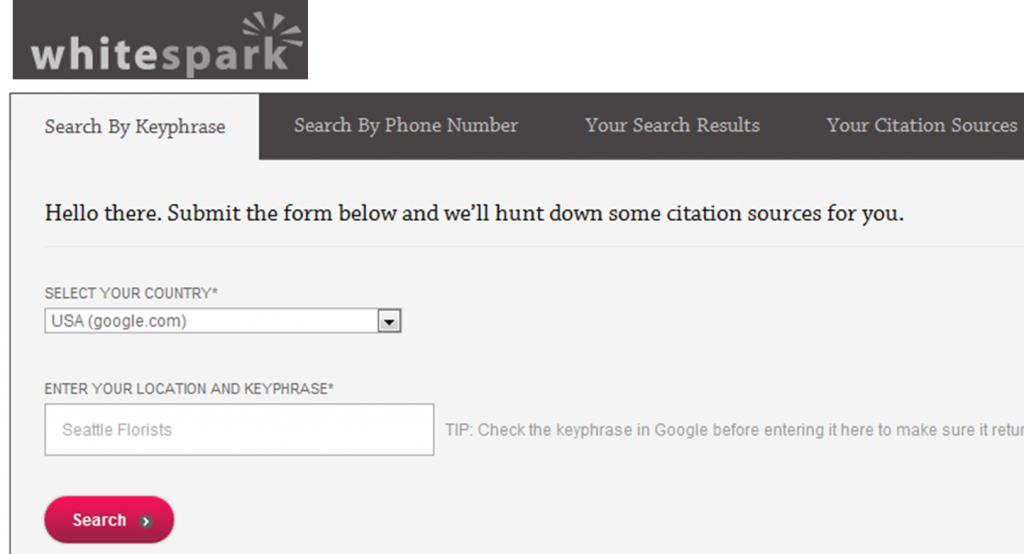Local SEO Tactics That Will Help You Crush Your Competition
by Anvil on March 4, 2014Local SearchLocal SEO is becoming more and more important as consumers access information on the go, become less patient in waiting for results and we continue to see increased power in those tiny devices that we carry with us wherever we go. The number of searches that have a local intent, meaning that a potential customer is searching for something in close proximity to their current location, has been said to be around 30%, per a blog post by David Mihm. If you’re searching from a mobile device, that jumps up to around 46% (a good median between what Google and Bing are reporting). Given the number of searches in a given month (roughly 100 Billion per month), that means, on just Google, there are about 30 Billion searches per month that have local intent. That says “lots of opportunity” to me!
If you’re a brick and mortar retail business with a physical location, and you’re not thinking about how you can capitalize on this opportunity, may I ask what you’re waiting for? Here are some helpful tips that will put you on the path to domination in the game of local search.
Website & Local Listing Optimization
When talking about local search there are a couple of pieces of optimization that need to happen, on-site and local listing. On-site optimization refers to your website, going through the best practices of ensuring you’re targeting the appropriate keywords, have a nicely structured, user-friendly website, etc. This is a no-brainer, and must be done to help Google understand what your business is selling. Here are some tips to ensure your site is optimized properly.
- Perform keyword research to ensure you are targeting the appropriate keywords. You can use keyword tools, look at your competition or review your AdWords account (if you’re running paid search). Use common sense here, for the most part, and choose keywords based on your business and location (i.e. Portland plumbing services).
- Create custom title & meta tags that incorporate your keywords and location. Reiterating your location will help both Google and customers have a better understanding of where you’re located.
- Build specific product and/or service pages that break out content into multiple pages as this will help you to optimize each page more completely.
- Utilize technical elements like Schema. If you’re unfamiliar with Schema, it allows search engines to parse out certain data and include this additional information in the search results. Some examples of this might be review ratings or pricing information (see screenshots). At the very least, retailers should be using the local schema markup.

I had previously mentioned the importance of off-site optimization, or local listing optimization. After your website has been properly optimized, you’ll need to also claim and verify your local listings with the major search engines and other important directories like Yelp, Insider Pages, Citysearch, Best of the Web, etc. Here is an awesome list, broken out by category from GetListed.org. When claiming your listings within these directories, make sure you are extra cautious with how you list your Name, Address & Phone (NAP). If there are inconsistencies with this information, such as a missing suite # or a missing/incorrect phone number, the engines will see this as a discrepancy and it will effect your potential for ranking.
Research Citations & Links
Are you the type of business owner that is continually chasing your competitors. Do you wake up in the morning, check the local results and scream to the heavens that your competition is still destroying you? Use that to your advantage. There are some great tools available that will help you mine your competition’s citations (business listings or mentions across the www). Use these tools to gain intelligence on where these competitors are getting links/citations, then go out and obtain your own from these same sites. Simple.
One tool I want to highlight is Whitespark’s Local Citation Finder tool. This is an incredible tool that allows you to see your citations, as well as your competitors’. You have the ability to search by keyword or phone number. Simply enter in your competitors’ phone numbers to see where they are getting citations. Now do the same for your own phone number. You can now cross reference these lists to get an understanding of where the opportunities lie. Another good tip is to see who is ranking in the top 3 results, then use this tool to see where they are getting citations from.

Build Citations
After you’ve identified a list of citations, it’s time to begin building your listings. There are multiple ways to do this given the large number of directories, so I’m going to stick to a few ways that are fairly simple and straightforward. The more difficult citations to obtain involve creating relationships with local media, businesses and bloggers. Usually the best things in life don’t come for free, right? Well, some of the best, most relevant citations will require some leg work on your part to make connections, and then build a good enough relationship where these folks will list your business, or better yet, write about your business (hopefully in a positive light).
The easier ways to build citations, however, are as follows:
- Go to GetListed.org and review this list. Start here. Go claim your local listings on these sites as they are some of the more trusted domains, which means a citation from these sites will be weighted more heavily. Remember, input the exact same NAP info that is on your website. The same format should be used across all directories.
- Utilize the tools the major data providers offer and submit your business information directly to them. This will ensure these data providers have the most up-to-date information. This is important as these data providers then syndicate their data to a large number of large and small directories. In order to obtain NAP consistency across the web, this is a vital step that will make your life much easier. The three top providers are Neustar, InfoGroup and Acxiom.
Generate Reviews
If you look at the 2013 local search ranking factors, which are conducted by David Mihm on an annual basis, you’ll see the importance of user reviews within the local search ranking algorithm. Reviews can certainly help to create additional visibility through increased rankings, but they are vitally important as consumers look to consumer reviews for additional insight about a business. What is the ambiance like, was the staff friendly, were the beds comfortable, etc. It’s extremely important to work to obtain honest reviews from customers. Clients always ask how to go about obtaining reviews, and I agree, it can be difficult, but here are some thoughts to get you started:
- Utilize email campaigns and include links to your G+ Local Page, Yelp page, etc. Make it easy for current customers to leave a review.
- Encourage your employees to talk about reviews. If a server at a restaurant can tell a guest had a great meal, enjoyed the service, etc, then encourage them to mention to the customer how reviews help spread the word and offer up a couple of suggestions on where to leave a review.
- Utilizing collateral can also be a good way. For example, use table top flyers to mention your social media accounts or local listings (where people can leave reviews). It’s a good reminder.
- Social media is another great way. It may just be as simple as a tweet that says “We’d love to get your feedback on your experience. Go to Yelp.com/xyz and leave us a review!” Or, if you notice that someone has left a positive review, mention that on your social profiles and link to it, this may encourage other happy customers to go do the same.
There are a lot of moving pieces when it comes to local search engine optimization, and I’ve merely scratched the surface here, but the above tips/suggestions should certainly provide you with a starting point to crush your competition. If you have any questions at all, don’t hesitate to contact Anvil at info at anvilmedia dot com. Anvil Media specializes in search engine and social media optimization and management, and local search is right in our wheelhouse. Let us know how we can help.
